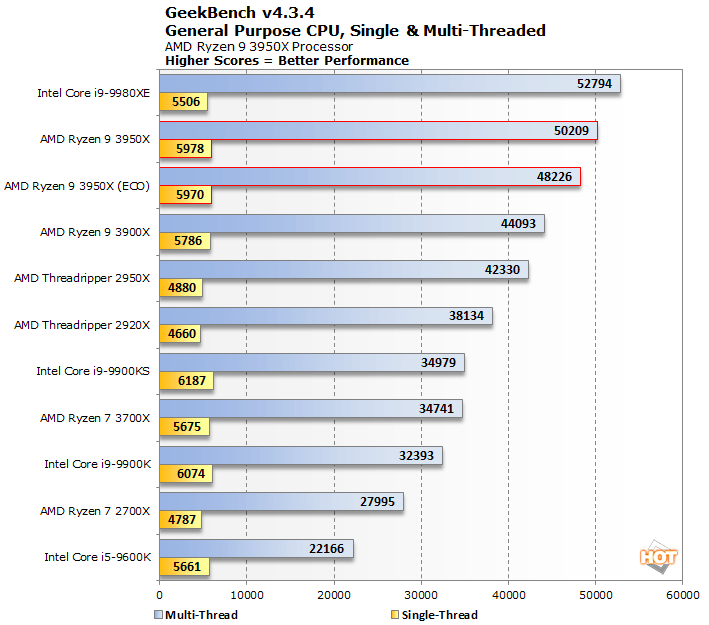Test System Configuration Notes: When configuring our test systems for this article, we first made sure all firmwares were up to date, then we entered each system's respective BIOS /
UEFI and set each board to its "Optimized" or "High performance" defaults. We then saved the settings, re-entered the BIOS and set the memory frequency to the maximum officially supported speed for the given platform (without overclocking). The
SSDs were then formatted, and the latest build of Windows 10 Pro x64 was installed and fully updated.

The AMD Ryzen 9 3950X
When the Windows installation was complete, we installed all of the drivers necessary for our components, disabled Auto-Updating and Windows Defender, and installed all of our benchmarking software. When that process was done, we performed a disk clean-up, cleared any temp and prefetch data, and optimized all of the SSDs using Windows' built-in utility. Finally, we enabled Windows Focus Assist to minimize any potential interruptions and let the systems reach an idle state before invoking a test.
Also note that throughout testing, we ran numbers on the Ryzen 9 3950X in both its default 105W TDP mode, and in its 65W "ECO" mode. With the latest edition of Ryzen Master, the additional lower-power ECO mode is available with some of AMD's Ryzen 3000 series processors.
 |
| HotHardware's Test Systems |
| Intel and AMD - Head To Head |
|
 |
| Preliminary Testing with SiSoft SANDRA 2020 |
| Synthetic Benchmarks |
|
We began our testing with the latest version of SiSoftware's SANDRA 2020, the System ANalyzer, Diagnostic and Reporting Assistant. We ran four of the built-in sub-system tests that partially comprise the suite with the Core i9-9900KS (CPU Arithmetic, Multimedia, Cache and Memory, and Memory Bandwidth). All of the scores reported below were taken with the CPU running at its default settings, with 16GB of DDR4 RAM running at 3,200MHz, in dual-channel mode, on the MSI MEG X570 Godlike motherboard.


AMD Ryzen 9 3950X
Processor Arithmetic |
AMD Ryzen 9 3950X
Multi-Media |


AMD Ryzen 9 3950X
Memory Bandwidth |
AMD Ryzen 9 3950X
Cache And Memory |
From the get-go, we see the benefits of the Ryzen 9 3950X's additional cores. In the Processor Arithmetic and Multimedia tests, the Ryzen 9 3950X is the highest-performing, mainstream AMD CPU released to date. In terms of Memory Bandwidth, we saw an aggregate score of around 33GB/s, which is right in-line with other Ryzen 3000 series processors, when paired to similarly-clocked memory. Cache and Memory latency also looks good, and lands somewhere in between the array the Intel reference systems. The massive amount of cache on the Ryzen 9 3950X, however, somewhat enhances these numbers, since so much data can be stored so close to the processor cores, minimizing calls out to main memory.
 |
|
Geekbench |
|
Synthetic CPU Testing |
|
In the GeekBench test, we're stressing only the CPU cores in a system (not graphics or GPU architecture), with both single and multi-threaded workloads. The tests are comprised of encryption processing, image compression, HTML5 parsing, physics calculations and other general purpose compute processing workloads.
The AMD Ryzen 9 3950X put up some strong numbers in Geekbench. In its default power mode, it was one of highest performing processors in both the single and multi-threaded tests. Only Intel's higher-clocked Coffee Lake-based processors offered better single-thread performance, and only the much more expensive, 18-core Core i9-9980XE put up a better multi-threaded score. Even in its low-power ECO mode, the AMD Ryzen 9 3950X is among the fastest processors here.
 |
| PCMark 10 |
| System Level Benchmark |
|
Next, up we have some full-system testing with PCMark. We're reporting all test results from the PCMark 10 benchmark suite, including the Essentials, Productivity, Digital Content Creation and and total PCMark score. The Essentials test covers workloads like web browsing, video conferencing and app start-up times, while Productivity tests everyday office apps from spreadsheets to word processing. Finally, the Digital Content Creation test evaluates performance of a machine with respect to photo and video editing, as well as rendering and visualization.
The AMD Ryzen 9 3950X's relatively high boost clock, support for up to 32-threads, and its huge total amount of cache, propel it into the lead in our PCMark 10 tests. It doesn't win across the board, though. Intel's Coffee Lake-based Core i9's outrun it in the "Essentials" test, where single-thread performance has more of an impact, but in the more heavily threaded "Productivity" and "DCC" tests, the AMD Ryzen 9 3950X come out on top.














